北京版四年级上英语全册教材知识点整理
- 格式:doc
- 大小:85.00 KB
- 文档页数:19
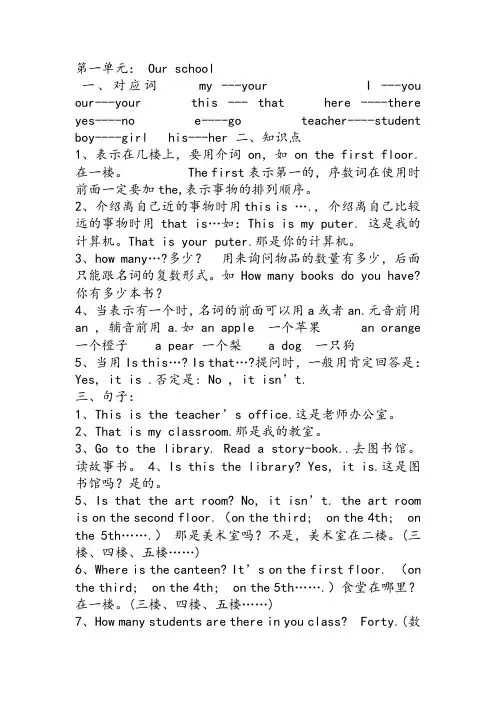
第一单元: Our school一、对应词my ---your I ---you our---your this --- that here ----there yes----no e----go teacher----student boy----girl his---her 二、知识点1、表示在几楼上,要用介词on,如on the first floor.在一楼。
The first表示第一的,序数词在使用时前面一定要加the,表示事物的排列顺序。
2、介绍离自己近的事物时用this is …., 介绍离自己比较远的事物时用that is…如:This is my puter. 这是我的计算机。
That is your puter.那是你的计算机。
3、how many…?多少?用来询问物品的数量有多少,后面只能跟名词的复数形式。
如How many books do you have?你有多少本书?4、当表示有一个时,名词的前面可以用a或者an.元音前用an , 辅音前用a.如 an apple 一个苹果an orange一个橙子 a pear 一个梨 a dog 一只狗5、当用Is this…? Is that…?提问时,一般用肯定回答是:Yes, it is .否定是: No , it isn’t.三、句子:1、This is the teacher’s office.这是老师办公室。
2、That is my classroom.那是我的教室。
3、Go to the library. Read a story-book..去图书馆。
读故事书。
4、Is this the library? Yes, it is.这是图书馆吗?是的。
5、Is that the art room? No, it isn’t. the art roomis on the second floor.(on the third; on the 4th; onthe 5th…….)那是美术室吗?不是,美术室在二楼。
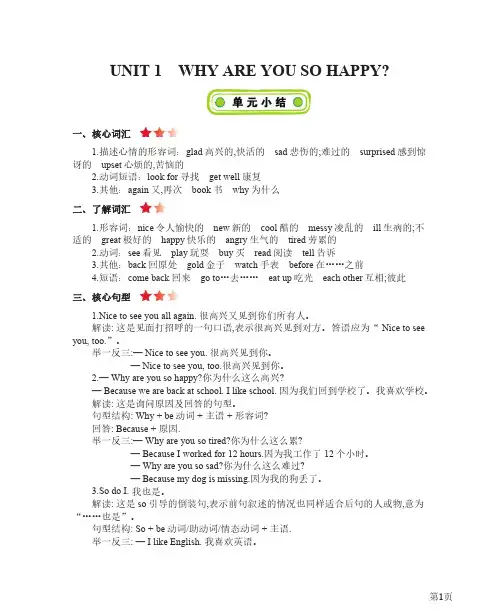
UNIT1WHY ARE YOU SO HAPPY?一、核心词汇1.描述心情的形容词:glad高兴的,快活的sad悲伤的;难过的surprised感到惊讶的upset心烦的,苦恼的2.动词短语:look for寻找get well康复3.其他:again又,再次book书why为什么二、了解词汇1.形容词:nice令人愉快的new新的cool酷的messy凌乱的ill生病的;不适的great极好的happy快乐的angry生气的tired劳累的2.动词:see看见play玩耍buy买read阅读tell告诉3.其他:back回原处gold金子watch手表before在……之前4.短语:come back回来go to…去……eat up吃光each other互相;彼此三、核心句型1.Nice to see you all again.很高兴又见到你们所有人。
解读:这是见面打招呼的一句口语,表示很高兴见到对方。
答语应为“Nice to see you,too.”。
举一反三:—Nice to see you.很高兴见到你。
—Nice to see you,too.很高兴见到你。
2.—Why are you so happy?你为什么这么高兴?—Because we are back at school.I like school.因为我们回到学校了。
我喜欢学校。
解读:这是询问原因及回答的句型。
句型结构:Why+be动词+主语+形容词?回答:Because+原因.举一反三:—Why are you so tired?你为什么这么累?—Because I worked for12hours.因为我工作了12个小时。
—Why are you so sad?你为什么这么难过?—Because my dog is missing.因为我的狗丢了。
3.So do I.我也是。
解读:这是so引导的倒装句,表示前句叙述的情况也同样适合后句的人或物,意为“……也是”。
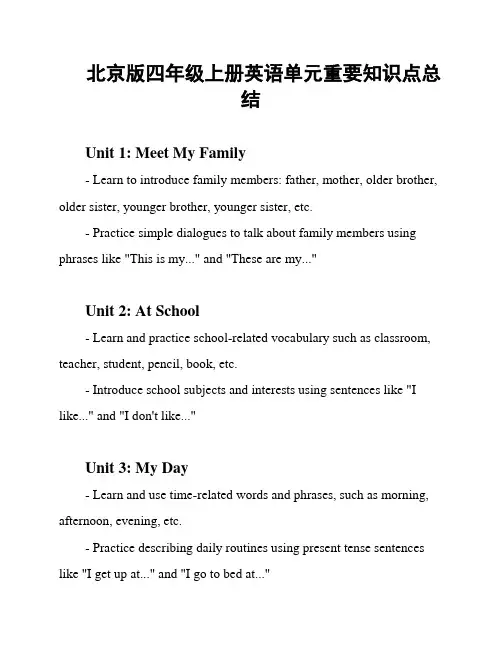
北京版四年级上册英语单元重要知识点总结Unit 1: Meet My Family- Learn to introduce family members: father, mother, older brother, older sister, younger brother, younger sister, etc.- Practice simple dialogues to talk about family members using phrases like "This is my..." and "These are my..."Unit 2: At School- Learn and practice school-related vocabulary such as classroom, teacher, student, pencil, book, etc.- Introduce school subjects and interests using sentences like "I like..." and "I don't like..."Unit 3: My Day- Learn and use time-related words and phrases, such as morning, afternoon, evening, etc.- Practice describing daily routines using present tense sentences like "I get up at..." and "I go to bed at..."- Understand and use words related to the activities performed during different times of the day.Unit 4: My Toys- Learn and identify different toy names with words like doll, ball, robot, car, etc.- Describe toys using adjectives and simple sentences like "It'sbig/small/light/heavy/fun."Unit 5: My Body- Learn and recognize body parts vocabulary like head, shoulders, knees, toes, etc.- Practice asking and answering questions related to body parts using sentences like "What's this?" and "These are my..."Unit 6: At the Park- Learn and understand words and phrases related to park activities, such as swing, slide, seesaw, etc.- Describe park activities and express preferences using phrases like "I like to..." and "I don't like to..."Unit 7: In the Kitchen- Learn and practice kitchen-related vocabulary, including words like table, chair, fridge, stove, etc.- Understand and use simple imperative sentences like "Sit down" and "Stand up" in a kitchen context.Unit 8: At the Zoo- Learn and recognize animal names, such as lion, elephant, giraffe, monkey, etc.- Practice asking and answering questions about animals using sentences like "What's this?" and "Is it a...?"- Understand and use adjectives to describe animals.以上就是北京版四年级上册英语单元的重要知识点总结。
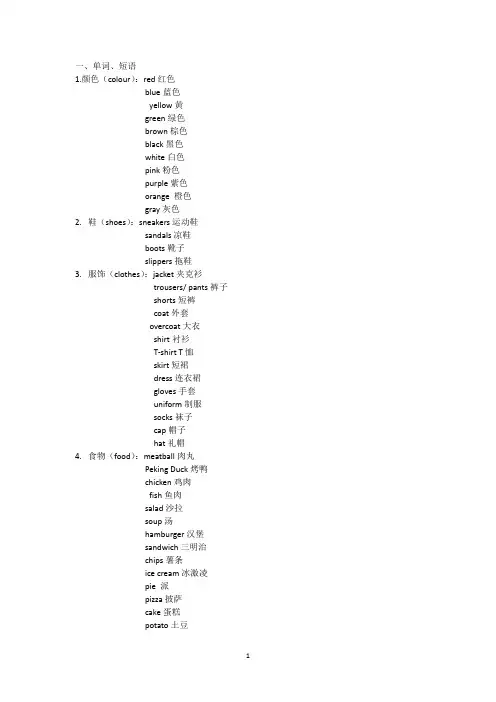
一、单词、短语1.颜色(colour):red红色blue蓝色yellow黄green绿色brown棕色black黑色white白色pink粉色purple紫色orange 橙色gray灰色2.鞋(shoes):sneakers运动鞋sandals凉鞋boots靴子slippers拖鞋3.服饰(clothes):jacket夹克衫trousers/ pants裤子shorts短裤coat外套overcoat大衣shirt衬衫T-shirt T恤skirt短裙dress连衣裙gloves手套uniform制服socks袜子cap帽子hat礼帽4.食物(food):meatball肉丸Peking Duck烤鸭chicken鸡肉fish鱼肉salad沙拉soup汤hamburger汉堡sandwich三明治chips薯条ice cream冰激凌pie 派pizza披萨cake蛋糕potato土豆cabbage卷心菜mushroom蘑菇5.饮品(drinks):water水milk牛奶tea茶soy milk豆浆juice 果汁6.数字(number):onetwothreefour fivesixseveneightnineteneleventwelvethirteenfourteenfifteensixteenseventeeneighteennineteentwenty20thirty30forty40fifty50sixty60seventy70eighty80ninety90one hundred100 7.自然(nature): snow雪,下雪rain雨,下雨wind风ice冰air空气8.天气(weather)snowy下雪的rainy多雨的windy刮风的cloudy多云的sunny阳光充足的fine晴朗的hot热的cold 冷的warm温暖的cool凉爽的9.地点(place)park school farm zoo forest lake grassland mountain10.季节(season)spring春天summer夏天autumn/fall秋天winter冬天动词短语:want to想要look nice看起来好look at看try .on试穿get cold 变冷take your order点餐become water变成水go to parks去公园take long walks去散步close to nature 亲近自然visit my uncle看望我的叔叔find out找到其他短语、短句:Excuse me打扰下here you are给您how much多少钱 a pair of一双how about怎么样Of course 当然for me 给我in summer在夏天In Sydney在悉尼on weekends在周末on a farm在农场in the forest在森林on the grassland在草原by the lake 在湖边in the mountains在山上on the internet 在网上二、句子:购物 1.Can I help you?/What can I do for you? 我能帮你吗?Yes. I want to get a pen. 是的。
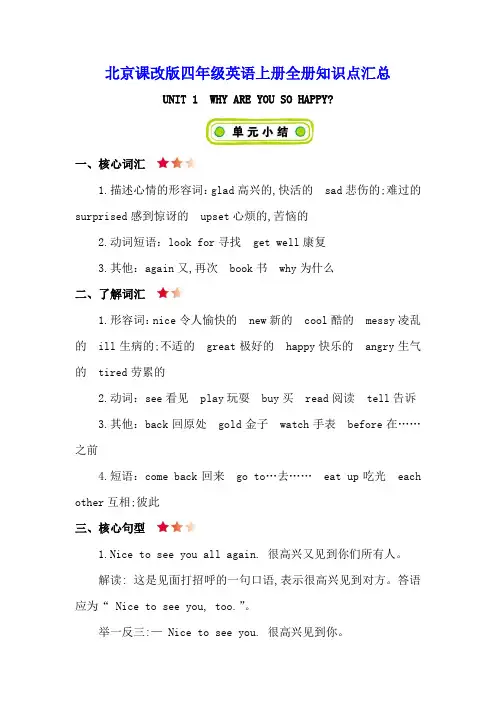
北京课改版四年级英语上册全册知识点汇总UNIT 1 WHY ARE YOU SO HAPPY?一、核心词汇1.描述心情的形容词:glad高兴的,快活的sad悲伤的;难过的surprised感到惊讶的upset心烦的,苦恼的2.动词短语:look for寻找get well康复3.其他:again又,再次book书why为什么二、了解词汇1.形容词:nice令人愉快的new新的cool酷的messy凌乱的ill生病的;不适的great极好的happy快乐的angry生气的tired劳累的2.动词:see看见play玩耍buy买read阅读tell告诉3.其他:back回原处gold金子watch手表before在……之前4.短语:come back回来go to…去……eat up吃光each other互相;彼此三、核心句型1.Nice to see you all again. 很高兴又见到你们所有人。
解读: 这是见面打招呼的一句口语,表示很高兴见到对方。
答语应为“ Nice to see you, too.”。
举一反三:— Nice to see you. 很高兴见到你。
— Nice to see you, too.很高兴见到你。
2.— Why are you so happy?你为什么这么高兴?— Because we are back at school. I like school. 因为我们回到学校了。
我喜欢学校。
解读: 这是询问原因及回答的句型。
句型结构: Why + be动词 + 主语 + 形容词?回答: Because + 原因.举一反三:— Why are you so tired?你为什么这么累?— Because I worked for 12 hours.因为我工作了12个小时。
— Why are you so sad?你为什么这么难过?— Because my dog is missing.因为我的狗丢了。
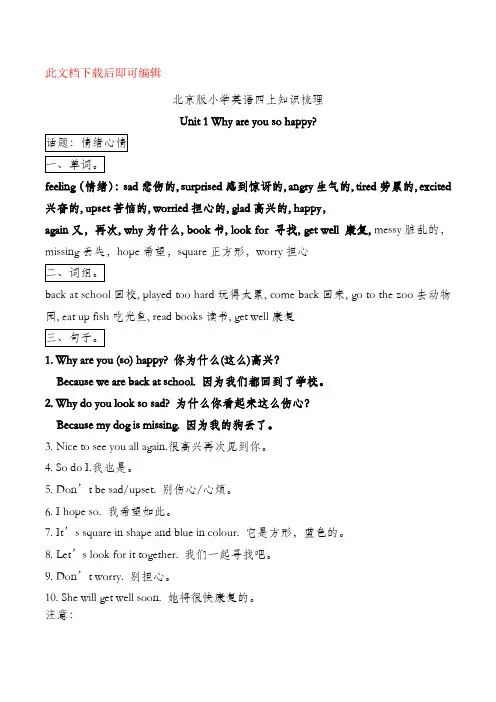
此文档下载后即可编辑北京版小学英语四上知识梳理Unit 1 Why are you so happy?feeling(情绪):sad悲伤的, surprised感到惊讶的, angry生气的, tired劳累的, excited 兴奋的, upset苦恼的, worried担心的,glad高兴的, happy,again又,再次, why为什么, book书, look for 寻找, get well 康复, messy脏乱的,missing丢失,hope希望,square正方形,worry担心back at school回校, played too hard玩得太累, come back回来, go to the zoo去动物园, eat up fish吃光鱼, read books读书, get well康复1. Why are you (so) happy? 你为什么(这么)高兴?Because we are back at school. 因为我们都回到了学校。
2. Why do you look so sad? 为什么你看起来这么伤心?Because my dog is missing. 因为我的狗丢了。
3. Nice to see you all again.很高兴再次见到你。
4. So do I.我也是。
5. D on’t be sad/upset. 别伤心/心烦。
6. I hope so. 我希望如此。
7. It’s square in shape and blue in colour. 它是方形,蓝色的。
8. Let’s look for it together. 我们一起寻找吧。
9. Don’t worry. 别担心。
10. She will get well soon. 她将很快康复的。
注意:句子的表达及人称和动词搭配I am, you/we/they are, he/she/ it is.I/you/we do, he/she/it doesUnit 2 May I speak to Mike?话题:打电话speak说话, robot机器人, housework家务劳动, Ms女士, Mrs太太, there在那里, really真的, bring带来, school学校, bad严重的, cold感冒, drink喝have a look看一看, do housework做家务, hold on稍等, call back回电话, bad cold重感冒, go to school去上学, stay in bed卧床休息, drink a lot of water大量喝水, play football踢足球, come to my birthday party参加我的生日聚会,bring… to school带到学校来,call back回电话,1. May I speak to Mike? This is Yangyang. 我能找一下麦克吗?我是洋洋。
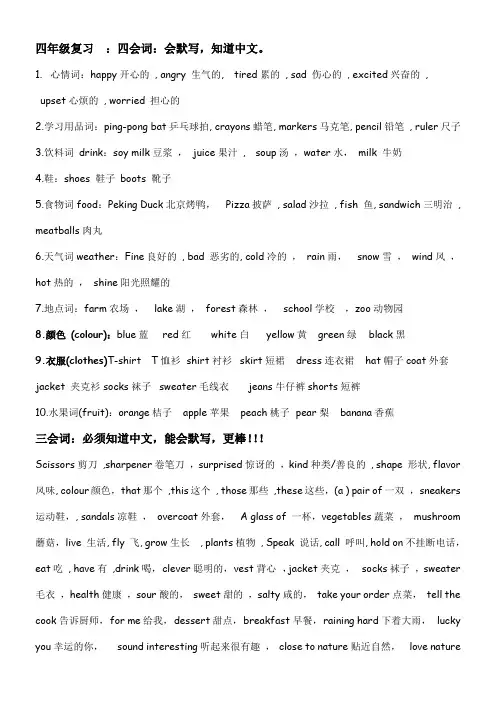
四年级复习:四会词:会默写,知道中文。
1.心情词:happy开心的, angry 生气的, tired累的, sad 伤心的, excited兴奋的, upset心烦的, worried 担心的2.学习用品词:ping-pong bat乒乓球拍, crayons蜡笔, markers马克笔, pencil铅笔, ruler尺子3.饮料词drink:soy milk豆浆,juice果汁, soup汤,water水,milk 牛奶4.鞋:shoes 鞋子boots 靴子5.食物词food:Peking Duck北京烤鸭,Pizza披萨, salad沙拉, fish 鱼, sandwich三明治, meatballs肉丸6.天气词weather:Fine良好的, bad 恶劣的, cold冷的,rain雨,snow雪,wind风,hot热的,shine阳光照耀的7.地点词:farm农场,lake湖,forest森林,school学校,zoo动物园8.颜色 (colour):blue蓝 red红 white白 yellow黄 green绿 black黑9.衣服(clothes)T-shirt T恤衫 shirt衬衫skirt短裙 dress连衣裙 hat帽子coat外套jacket 夹克衫 socks袜子 sweater毛线衣 jeans牛仔裤shorts短裤10.水果词(fruit):orange桔子 apple苹果 peach桃子 pear梨banana香蕉三会词:必须知道中文,能会默写,更棒!!!Scissors剪刀,sharpener卷笔刀,surprised惊讶的,kind种类/善良的, shape 形状, flavor 风味, colour颜色,that那个,this这个, those那些,these这些,(a ) pair of一双,sneakers 运动鞋,, sandals凉鞋,overcoat外套, A glass of 一杯,vegetables蔬菜,mushroom 蘑菇,live 生活, fly 飞, grow生长, plants植物, Speak 说话, call 呼叫, hold on不挂断电话,eat吃, have有,drink喝,clever聪明的,vest背心,jacket夹克, socks袜子, sweater 毛衣,health健康,sour酸的,sweet甜的,salty咸的,take your order点菜,tell the cook告诉厨师,for me给我,dessert甜点,breakfast早餐,raining hard下着大雨,lucky you幸运的你,sound interesting听起来很有趣,close to nature贴近自然,love nature热爱自然,this winter vacation这个寒假,find out发现,on the internet在网上,everything每件事物,these things这些物品,go boating去划船,go swimming去游泳,go fishing去钓鱼,go ice-skating去滑冰,go skiing去滑雪,make a snowman堆雪人,spring春,summer夏,autumn秋,winter冬,Chinese food中国食物, Western food西餐,on the menu在菜单上,always一直,总是,often经常,sometimes有时,Hold these books拿住这些书, close the window关上窗户, turn off the light关灯,turn off the radio关上收音机, pass me the water把水递给我, opening the door打开门, turning on the light开灯,on a farm在农场, in the mountain 在山里, by the lake在湖边, in the forest 在森林里, on the grassland在草原上四年级主要句型,必须知道中文会默写!!!1.Why are you so happy ?Because we are back at school你们为什么这么开心?因为我们回到了学校。
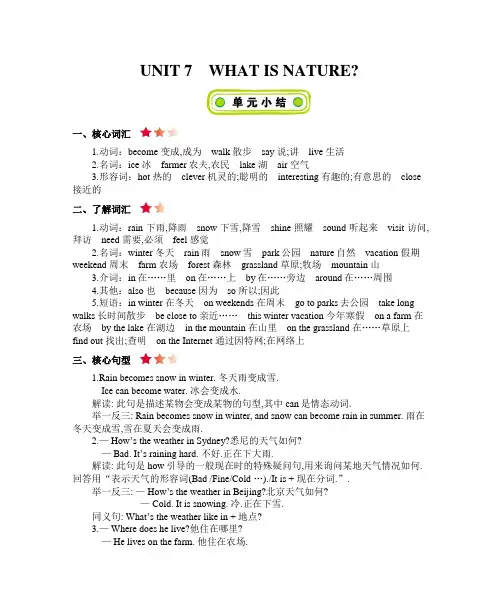
UNIT 7WHAT IS NATURE?一、核心词汇1.动词:become 变成,成为walk 散步say 说;讲live 生活2.名词:ice 冰farmer农夫,农民lake 湖air 空气3.形容词:hot 热的clever 机灵的;聪明的interesting 有趣的;有意思的close 接近的二、了解词汇1.动词:rain 下雨,降雨snow 下雪,降雪shine 照耀sound 听起来visit 访问,拜访need 需要,必须feel 感觉2.名词:winter 冬天rain雨snow雪park公园nature自然vacation 假期weekend 周末farm 农场forest 森林grassland 草原;牧场mountain 山3.介词:in在……里on在……上by在……旁边around在……周围4.其他:also 也because 因为so 所以;因此5.短语:in winter 在冬天on weekends 在周末go to parks去公园take long walks 长时间散步be close to 亲近……this winter vacation 今年寒假on a farm 在农场by the lake 在湖边in the mountain 在山里on the grassland 在……草原上find out 找出;查明on the Internet 通过因特网;在网络上三、核心句型1.Rain becomes snow in winter. 冬天雨变成雪.Ice can become water. 冰会变成水.解读: 此句是描述某物会变成某物的句型,其中 can是情态动词.举一反三: Rain becomes snow in winter, and snow can become rain in summer. 雨在冬天变成雪,雪在夏天会变成雨.2.— How’s the weather in Sydney?悉尼的天气如何?— Bad. It’s raining hard. 不好.正在下大雨.解读: 此句是how引导的一般现在时的特殊疑问句,用来询问某地天气情况如何.回答用“表示天气的形容词(Bad /Fine/Cold …)./It is + 现在分词.”.举一反三: — How’s the weather in Beijing?北京天气如何?— Cold. It is snowing. 冷.正在下雪.同义句: What’s the weather like in + 地点?3.— Where does he live?他住在哪里?— He lives on the farm. 他住在农场.解读: 此句是where引导的一般现在时的特殊疑问句,是询问他人住在哪里的句型.举一反三: — Where does Lily live?莉莉住在哪里?— She lives in Guangzhou. 她住在广州.4.We can’t live without water or air. 没有水和空气我们不能生存.解读: 这是一个陈述某人或某物没有某物不能生存的句型.举一反三: We can’t live without food. 没有食物我们不能生存.四、了解句型1.— What do you do on weekends?你周末做什么?— I often go to parks or take long walks. 我经常去公园或长时间散步.解读: 此句是what引导的一般现在时的特殊疑问句,用来询问他人某时做某事的句型.举一反三: — What do you do on weekends?你周末做什么?— I write stories on weekends. 我周末写故事.2.I’m going to visit my uncle this winter vacation. 今年寒假我要去看望我的叔叔.解读: 此句是一般将来时的肯定句,陈述某人将要做某事.be going to 表将来,后跟动词原形,还可使用will 替换 be going to.举一反三: He is going to visit his aunt on Sunday. 星期日他要去看望他的姑姑.3.Let’s find out on the Internet. 我们在网上查一查吧.解读: 此句是由let引导的祈使句,表达向对方提出建议.举一反三: Let’s go to the zoo this Sunday together. 我们星期日一起去动物园吧.4.We feel happy to be close to nature. 亲近大自然我们感到高兴.解读: 此句是陈述句,用来描述某人做某事的感觉.feel是系动词,其后接形容词.举一反三: He feels sorry to be late for school. 他为上学迟到感到很抱歉.。
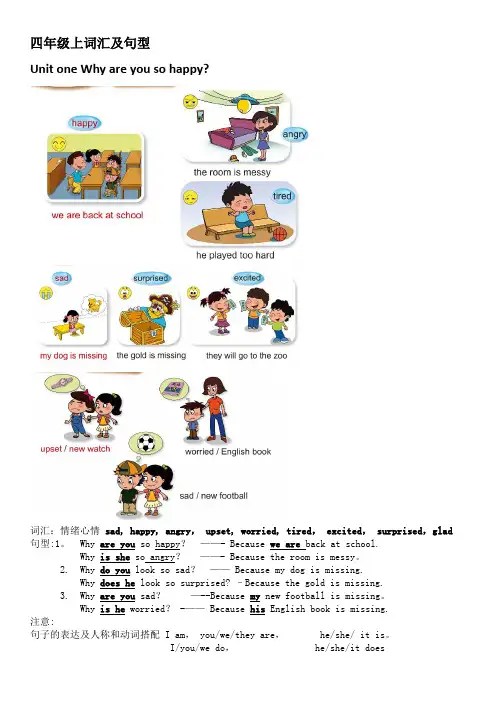
四年级上词汇及句型Unit one Why are you so happy?词汇:情绪心情 sad, happy, angry, upset, worried, tired, excited, surprised,glad 句型:1。
Why are you so happy?——- Because we are back at school.Why is she so angry?——- Because the room is messy。
2. Why do you look so sad?—— Because my dog is missing.Why does he look so surprised? –Because the gold is missing.3. Why are you sad?—--Because my new football is missing。
Why is he worried? -—— Because his English book is missing.注意:句子的表达及人称和动词搭配 I am, you/we/they are, he/she/ it is。
Unit two May I speak to Mike?话题:打电话短语表达: call打电话, call back回电话,speak, bring… to school带来telephone(cell phone手机,telegraph电报),My number is… bad cold重感冒 Stay in bed, drink a lot of waterWhat can I do for you?我能做些什么He is doing housework with his mother。
做家务I have…我有… I have some books。
He has a new robot.句型结构: 1. May I speak to Mike? This is Lingling.Speaking。
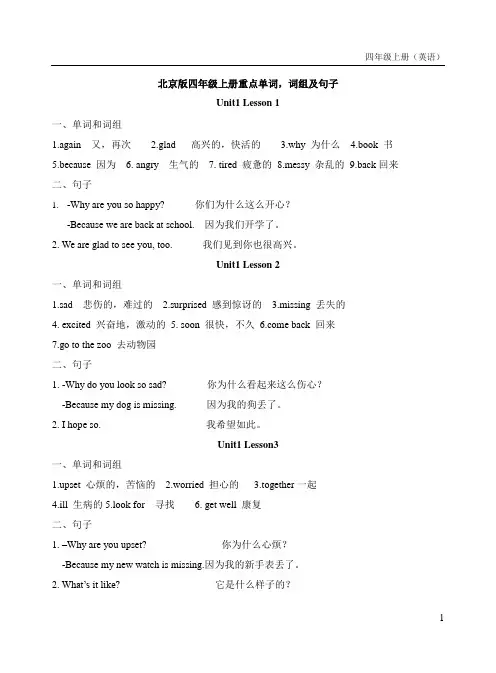
四年级上册(英语)北京版四年级上册重点单词,词组及句子Unit1 Lesson 1一、单词和词组1.again 又,再次2.glad 高兴的,快活的3.why 为什么4.book 书5.because 因为6. angry 生气的7. tired 疲惫的8.messy 杂乱的9.back回来二、句子1.-Why are you so happy? 你们为什么这么开心?-Because we are back at school. 因为我们开学了。
2. We are glad to see you, too. 我们见到你也很高兴。
Unit1 Lesson 2一、单词和词组1.sad 悲伤的,难过的2.surprised 感到惊讶的3.missing 丢失的4. excited 兴奋地,激动的5. soon 很快,不久e back 回来7.go to the zoo 去动物园二、句子1. -Why do you look so sad? 你为什么看起来这么伤心?-Because my dog is missing. 因为我的狗丢了。
2. I hope so. 我希望如此。
Unit1 Lesson3一、单词和词组1.upset 心烦的,苦恼的2.worried 担心的3.together一起4.ill 生病的5.look for 寻找6. get well 康复二、句子1. –Why are you upset? 你为什么心烦?-Because my new watch is missing.因为我的新手表丢了。
2. What’s it like? 它是什么样子的?2It’s square in shape and blue in colour. 它是正方形的蓝色手表。
Unit2 Lesson5一、单词和词组1.speak 说话2.robot 机器人3.housework 家务劳动4.Ms 女士5.Mrs 太太,夫人6.hold on 稍等7.have a look 看一看8.do housework 做家务9.do homework 做家庭作业二、句子1. May I speak to Mike? This is Yangyang. 我可以和迈克通话吗?我是阳阳。
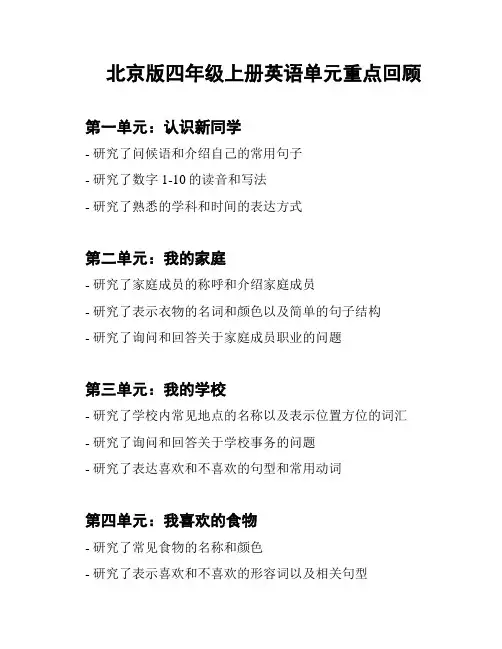
北京版四年级上册英语单元重点回顾
第一单元:认识新同学
- 研究了问候语和介绍自己的常用句子
- 研究了数字1-10的读音和写法
- 研究了熟悉的学科和时间的表达方式
第二单元:我的家庭
- 研究了家庭成员的称呼和介绍家庭成员
- 研究了表示衣物的名词和颜色以及简单的句子结构
- 研究了询问和回答关于家庭成员职业的问题
第三单元:我的学校
- 研究了学校内常见地点的名称以及表示位置方位的词汇- 研究了询问和回答关于学校事务的问题
- 研究了表达喜欢和不喜欢的句型和常用动词
第四单元:我喜欢的食物
- 研究了常见食物的名称和颜色
- 研究了表示喜欢和不喜欢的形容词以及相关句型
- 研究了表达食物数量的数量词
第五单元:城市与乡村
- 研究了城市和乡村的常见建筑物和交通工具的名称
- 研究了表达位置关系和方位的介词
- 研究了询问和回答关于所在地点和如何去某地的问题
第六单元:动物世界
- 研究了常见动物的名称和特征
- 研究了询问和回答关于动物性和所属类别的问题
- 研究了表达动物数量的计量词
第七单元:圣诞节快乐
- 研究了关于圣诞节的常见词汇和俗
- 研究了表达圣诞祝福的句子和常用动词短语
- 研究了关于圣诞礼物的表达方式
以上是北京版四年级上册英语单元的重点回顾。
希望同学们能够通过复习,巩固所学的知识,并取得更好的学习成绩!。
UNIT ONE WHY ARE YOU SO HAPPY? 班级__________________ 姓名____________________ 一、中英互译二、仿照例句写 2 句话。
三、根据课文内容,补全单词。
at school again. They like school. They are _____ to see each other. Guoguo is so happy, becauseis _____. Lingling _____ him not to be sad. Sheis _____. Yangyang _____ her to _____ _____ it, and tells her not to be _____. Yangyang looksUNIT TWO MAY I SPEAK TO MIKE? 班级__________________ 姓名____________________ 一、中英互译二、仿照例句写 2 句话。
三、根据课文内容,补全单词。
Shecannotgives Yangyang has a new ______. It’s a birthday gift________. He is now calling Mike, but Mike is _____. He is ______________ with his mum. He is a goodUNIT THREE WILL YOU DO ME A FAVOUR? 班级__________________ 姓名____________________ 一、中英互译二、仿照例句写 2 句话。
Maomao meets Sara in the street. He wants to get the key toto ______ these books for him. Sara is willing to ______. SheBaobao's grandma would like to play ____ _______ on theLingling is carrying things to the class, so she can't ______ the door. She asks Yangyang to help. He is very glad that heLingling's mom feels a little bit _____ when she sits on theMike and Baobao are going to have a ___________ match, but Baobao does not have his ping-pong _______ with him.goodUNIT FIVE WHICH KIND WOULD YOU LIKE? 班级__________________ 姓名____________________ 一、中英互译二、仿照例句写 2 句话。
北京课改版四年级英语上册全册知识点汇总UNIT 1 WHY ARE YOU SO HAPPY?一、核心词汇1.描述心情的形容词:glad高兴的,快活的sad悲伤的;难过的surprised感到惊讶的upset心烦的,苦恼的2.动词短语:look for寻找get well康复3.其他:again又,再次book书why为什么二、了解词汇1.形容词:nice令人愉快的new新的cool酷的messy凌乱的ill生病的;不适的great极好的happy快乐的angry生气的tired劳累的2.动词:see看见play玩耍buy买read阅读tell告诉3.其他:back回原处gold金子watch手表before在……之前4.短语:come back回来go to…去……eat up吃光each other互相;彼此三、核心句型1.Nice to see you all again. 很高兴又见到你们所有人。
解读: 这是见面打招呼的一句口语,表示很高兴见到对方。
答语应为“ Nice to see you, too.”。
举一反三:— Nice to see you. 很高兴见到你。
— Nice to see you, too.很高兴见到你。
2.— Why are you so happy?你为什么这么高兴?— Because we are back at school. I like school. 因为我们回到学校了。
我喜欢学校。
解读: 这是询问原因及回答的句型。
句型结构: Why + be动词 + 主语 + 形容词?回答: Because + 原因.举一反三:— Why are you so tired?你为什么这么累?— Because I worked for 12 hours.因为我工作了12个小时。
— Why are you so sad?你为什么这么难过?— Because my dog is missing.因为我的狗丢了。
北京小学四年级英语知识点北京小学四年级的英语课程通常涵盖了一些基础的语法知识、词汇学习、日常会话以及简单的阅读和写作技巧。
以下是一些四年级学生可能会学到的英语知识点:1. 基础语法:- 学习基本的时态,如一般现在时、现在进行时。
- 掌握名词的单复数形式,如cat/cats, book/books。
- 学习形容词的比较级和最高级,如big, bigger, biggest。
2. 词汇学习:- 扩充日常词汇量,包括食物、颜色、动物、数字、家庭成员等。
- 学习与学校相关的词汇,如classroom, teacher, student, lesson等。
3. 日常会话:- 学习基本的问候语和告别语,如Hello, Goodbye, How are you? - 学习询问和表达喜好,如I like..., I don't like..., Do you like...?4. 阅读技巧:- 阅读简单的英语故事和文章,理解基本的故事情节。
- 学习如何通过图片和上下文线索来猜测生词的意思。
5. 写作技巧:- 学习写简单的句子,如主语+谓语+宾语结构。
- 练习写日记或简短的描述性段落。
6. 听力理解:- 通过听英语歌曲、故事和对话来提高听力理解能力。
- 学习如何从听力材料中获取信息并回答问题。
7. 文化知识:- 了解一些英语国家的文化习俗,如节日、饮食习惯等。
- 学习一些简单的英语谚语和习语。
8. 课堂活动:- 参与小组讨论和角色扮演,以提高口语交流能力。
- 通过游戏和互动活动来巩固所学知识。
9. 学习策略:- 学习如何使用字典查找生词。
- 学习如何制定学习计划和复习策略。
10. 自我评估:- 学会自我检查作业和练习,识别并改正错误。
- 通过定期的自我测试来评估自己的学习进度。
通过这些知识点的学习,四年级的学生将能够在英语语言的各个方面打下坚实的基础,为今后的英语学习奠定良好的基础。
北京版英语四年级上册单元要点整理Unit 1: Greetings- Practice responding to greetings appropriately.- Understand the importance of greetings in different social settings.Unit 2: Classroom Rules- Learn and follow classroom rules such as raising hand, listeningto the teacher, and being respectful to classmates.- Understand the importance of following rules for a conducive learning environment.- Discuss the consequences of not following classroom rules.Unit 3: Numbers- Learn to count from 1 to 100.- Practice writing and recognizing numbers.- Learn to use numbers in various contexts, such as telling time and giving phone numbers.Unit 4: Family- Learn vocabulary related to family members: father, mother, brother, sister, etc.- Describe family members using basic sentences.- Understand the roles and importance of family in our lives.Unit 5: School Subjects- Learn vocabulary related to school subjects, such as English, math, science, etc.- Identify and talk about different school subjects.- Discuss personal preferences and interests in various subjects.Unit 6: Food- Learn vocabulary related to food items, such as fruits, vegetables, snacks, etc.- Describe different food items using basic sentences.- Understand the importance of a balanced diet and making healthy food choices.Unit 7: Animals- Learn vocabulary related to animals, such as pets, farm animals, and wild animals.- Identify and talk about different animals.- Understand basic characteristics and habitat of various animals.Unit 8: Colors- Learn vocabulary related to colors.- Identify and talk about different colors.- Describe objects and things using colors.Unit 9: My Body- Learn vocabulary related to body parts, such as head, shoulders, knees, toes, etc.- Identify and talk about different body parts.- Understand the importance of taking care of our bodies.Unit 10: Clothes- Learn vocabulary related to different clothing items, such as shirts, pants, shoes, etc.- Describe clothing items and preferences using basic sentences.- Discuss appropriate clothing choices for different occasions.以上是北京版英语四年级上册单元要点的整理。
北京版四年级上全册教材知识点整理Unit 1 Why are you so happy?句型:1. 功能句型Why are you so happy?Because we are back to school again. I like school.Why do you look so sad?Because my dog is missing.Where did he go?He went to my grandpa's house.2. 重点句子Don’t be sad.I'm sure he will come back soon.I hope so. / I hope so, too.语法:1. 疑问词why引导的询问原因的特殊疑问句及其回答2. be /look + 形容词3. be动词的用法4. 形容词性的情绪词语与动词性的词语的使用方法5、动词过去式do—did, go—went;词汇:1. 表达情绪和状态的单词:sad , surprised, glad, great, happy, excited, angry, tied, sleepy; to laugh, to cry2. 动词:are, look, hope,3. 疑问副词why, where, when, what, who, how4. 人称代词(主格):I, you, he, she, it, they, we,5. 反义词:cry---laugh happy/glad---sad;6. 其他单词:t oo, again7. 重点词组:back at school, played too hard, come back, go to the zoo eat up fish, read books, get well语音:1. 元音:a, i, o, y2. 元音字母组合:ai , oo, ere,ea, ee, au,3. 辅音字母组合gh, whUnit 2 May I speak to Mike?句型: 1. 功能句型:May I speak to Yangyang?It's Maomao. Speaking.Is Guoguo there?Sorry, she is not home/here.Who's speaking? It's Lingling.2.重要句型:Can I do…? /I am sure… / I have a bad cold. I can’t go to school.语法: 1. speak to 和...说话,跟...说话;to 后面要用人称代词宾格形式。
2. speaking 是打电话专门用语, 打电话报姓名可以说This is ...(speaking)/ It's... (here).。
3. can, may, can't 后面用动词原形。
4.some意思是一些,后面如果是可数名词,要加s。
5. 指示代词these 意思是这些,如果后面是可数名词,要用复数形式。
6. stay in bed 待在床上。
7. a lot of 许多,大量,后面加不可数名词或可数名词复数形式。
8. 介词for的用法。
词汇: 1. 动词:may, speak, hear, call, drink;2. 形容词:bad;介词:there, later;3. 人称代词:them;4. 通讯工具:a telephone, a cell phone, a pay phone, a video phone, a cordless phone,a walkie- talkie;5. 重点词组:call somebody, answer the phone, call back, speak to, would love to,have a look, have a bad cold, stay in bed, drink a lot of water,do housework,hold on,go to school, play football,come to mybirthday party语音:字母组合:ay,ea,th,ere,er,ear,al or,的发音,元音字母:a, e, i, o的发音。
Unit 3 Will you do me a favour?句型: 1. 功能句型:1 Would you please hold the books for me?Certainly. Let me hold the books.2 Would you mind opening the door for me, please?Sure, I’d love to.3 Will you do me a favor?What can I do for you?I forgot my ping-pong paddle at home.4 Can I borrow yours?Sure. I will lend you mine.2.重要句型:1. It’s my pleasure.2. It’s so kind of you.3. Here are two. You can choose.语法1)Would you mind 的用法:mind后面的动词要用带-ing 的形式,即动名词。
2)名词性物主代词yours, mine在句子中起动名词的作用。
如:Can I borrow yours? =Can I borrow your ping-pong paddle (yours=your paddle)I will lend you mine. (mine=my paddle)3)祈使句let的使用:Let me try. 表示建议、请求、命令、警告等。
4)介词of和for的使用:It’s so kind of you. What can I do for you?5)It’s my pleasure (to help you).6)forgot 是forget 的过去式,指的是“刚才忘记了,现在才想起来”。
词汇动词:hold,find,let,borrow,lend,choose,mind名词: ping-pong paddle, swimming glasses, lifebelt, mountain bike, door,pleasure形容词:full,kind其他:certainly,forgot,yours重点词组:open the door ,hold the door,close the door,lock the door,turn on the light,turn off the light,lift the heavy box,put the book back,hold books, close the window, pass me the water,open the door,turn off the radio, turn on the light, play word game, a glass of water, do sb. a favour语音:元音字母和字母组合在单词中的发音:o, ar, oo, I, u, a, ou, aiUnit 4 REVISION句型:询问他人情绪原因:Why are you so happy?Because we are back to school again. I like school.Why do you look so sad?Because my dog is missing.询问“某人在过去时间到哪儿去了”:Where did he go?He went to my grandpa’s house.打电话找人:May I speak to……?Is ……there?接电话(询问你是谁):Who’s speaking? It’s ……请求他人帮助:Would you please hold the books for me?Certainly.Would you mind opening the door for me, please?Sure. I’d love to.借用物品:I forgot my ping-pong paddle at home.Can I borrow yours?Sure, I will lend you mine.语法:1、祈使句否定式Don’t ,don't后面要求接动词原形,用以劝阻某人的行为,动作;2、形容词在句子中做表语,要与系动词be 或look 连用,构成句子的谓语,形容词不能直接放在主语后面做谓语;3、动词过去式的用法;do—did, go—went;4、speak to 和...说话,跟...说话;to 后面要用人称代词宾格形式。
5、speaking 是打电话专用语, 打电话用语表示我是…可以说This is ...(speaking)/ It's... 。
6、情态动词can, may, can't 后面跟动词原形。
7、Would you please后面跟动词原形;8、Would you mind +动词的ing 形式;9、borrow、lend 的用法:borrow是借入,lend是借出;10、名词性物主代词的用法。
(yours, mine)词汇:形容词(情绪):glad, sad, surprised, great, happy, excited, angry, tired, sleepy.动词:look, hope ,went ,speak,hear, drink,hold, call , find,let ,mind,forgot borrow,lend , choose, laugh, cry, lift, lock名词:door , pleasure人称代词(主格):we人称代词(宾格):them,me物主代词(名词性):yours ,mine特殊疑问代词:why, where副词:again, too, there, later, certainly通讯工具:a telephone, a cell phone, a pay phone, a video phone,a cordless phone, a walkie- talkie动词词组:call somebody, answer the phone, open the door, hold the door open, close the door, lock the door, turn on the light, turn off the light,lift the heavy box, put the book back.语音:1、元音字母i和字母组合ea在单词中的发音。